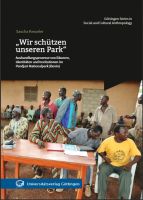"Wir schützen unseren Park" - Aushandlungsprozesse von Räumen, Identitäten und Institutionen im Pendjari-Nationalpark (Benin)
Author(s)
Kesseler, Sascha,
Collection
AG UniversitätsverlageLanguage
GermanAbstract
Pendjari National Park in northern Benin is not only a tourist attraction and an area for the protection of biodiversity, it is also a showcase for participatory management approaches. Since its foundation as an animal protection area in 1954 under French colonial rule, the park has been object of often conflictual but productive negotiations between different groups of neighboring dwellers, such as peasants, herdsmen and hunters, as well as the park administration itself. During 19 months of fieldwork, ethnographic data on conflicts and negotiation processes were collected. Their detailed analyses show how different groups of actors construct the park as a socially relevant entity. Data from historical investigation and an extended case study of the participatory attempts at cooperation between the park administration and local hunters illustrate the social construction of spaces, identities as well as norms, values and institutions: Local hunters consider the park primarily a nowadays illegal hunting ground and a domain of spirits, while park administrators and international development actors declare it a zone of state-protected biodiversity. By showing how the national park and related spaces, identities, norms, values and institutions are socially produced, the analysis contributes to recent debates in the field of human-environment interaction and especially political ecology. Moreover, it offers complex insights and practical recommendations regarding participatory approaches to the management of natural resources and especially national parks. Der Pendjari-Nationalpark in Nordbenin ist nicht nur touristisch attraktiv und bedeutsam für den Schutz von Biodiversität, sondern auch ein Vorzeigeprojekt für partizipative Verwaltungsansätze. Er wurde 1954 während der französischen Kolonialzeit als Wildschutzgebiet gegründet und ist seitdem Objekt konfliktreicher, aber produktiver Aushandlungsprozesse zwischen Akteuren der Anrainer – wie Feldbauern, Viehhirten, Jäger – und der Parkverwaltung. Während einer 19-monatigen Feldforschung wurden ethnographische Daten über Konflikte und Verhandlungsprozesse zwischen den Akteuren gesammelt. Die Analysen der Interaktionen machen deutlich, wie der Nationalpark auf unterschiedliche Art als sozial relevante Realität von verschiedenen Akteursgruppen konstruiert wird. Anhand einer historischen Betrachtung der Parkentwicklung und einer Fallstudie zu den Kooperationsbestrebungen zwischen der Parkverwaltung und den lokalen Jägern wird deutlich, wie Räume und Identitäten sowie Normen, Werte und Institutionen im partizipativen Verhandlungsprozess konstruiert werden: Die lokalen Jäger betrachten das Parkgebiet in erster Linie als ein Jagdgebiet und als Welt der Geister, während die Parkverwaltung und Akteure der internationalen Entwicklungszusammenarbeit dieses Territorium als staatlich geschütztes Gebiet für Biodiversität deklarieren. Die detaillierte Analyse der ethnographischen Daten leistet einen Beitrag zu wissenschaftlichen Debatten der Mensch-Umwelt-Beziehungen sowie insbesondere der politischen Ökologie, indem sie die soziale Produktion des Nationalparks und der mit ihm verbundenen Räume, Identitäten, Normen, Werte und Institutionen betrachtet. Darüber hinaus lassen sich auch praktische Empfehlungen für die Gestaltung einer partizipativen Verwaltung von Naturschutzgebieten und insbesondere von Nationalparks ableiten.
Keywords
Pendjari National Park; showcase; participatory management approaches; Anrainer; Förster; Jagd; Partizipation; WildereiDOI
10.17875/gup2017-1026ISBN
9783863952624OCN
1030821040Publisher
Universitätsverlag GöttingenPublication date and place
2017Classification
Society and Social Sciences


 Download
Download Web Shop
Web Shop